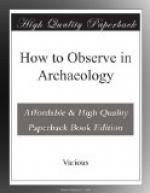Before leaving home, the traveller will be well advised to make inquiries at the museums or at the head-quarters of the archaeological societies which concern themselves specially with the places which he intends to visit. A list of these museums and societies is appended to this section (p. 26). It is hardly necessary to warn him that archaeological training cannot be acquired in a few days, and that he will have to buy his experience in various ways; but the more time he can devote to working through the collections in this country, the more useful will be his observations abroad. He will be able to learn what kind of antiquities it is especially desirable to look for, not merely with the object of filling gaps in the public collections, but for the advancement of archaeological knowledge in general.
The object of archaeological travel and excavation is not to collect antiquities so that they may be arranged according to the existing catalogues of museums, but to collect fresh information to amplify and correct what we now know, to make our knowledge of the past more complete and useful.
On arrival in the country of his choice, he is recommended to continue at the National Museum the study, which we suppose he has already begun in the museums at home, of the kind of antiquities which he is likely to come across. But he should also take an early opportunity of getting into touch with the local British Archaeological School or other similar institution, where he will receive advice what to look for and where and how to look, and assistance in procuring suitable equipment. Thus the traveller who starts from Athens or Jerusalem should apply at the British School of Archaeology. He may there, it he desires, receive instruction in any of the methods described in Chapter ii, in which a little practical demonstration is worth pages of print, and will be given all possible assistance in obtaining such articles of equipment as are available on the spot. (Photographic supplies and all scientific instruments should be brought out from England.) The best maps of the district will also be accessible for examination (but the traveller is recommended to make inquiries in this respect before leaving England); the libraries will provide the literature dealing with the routes he proposes to take; and such a collection as the type-series of pottery and the Finlay collection of prehistoric antiquities at the British School at Athens may be useful to supplement his previous studies at museums, and enable him to observe with intelligence the potsherds, &c., that he may find on an ancient site. In return, he will be expected to report his results either to the School or to some other scientific society or museum at home. It should be unnecessary to remind him that the conditions of the law of the land relating to the reporting of discoveries to the competent authorities should be strictly observed. Such authorities should also be informed of any destruction or removal of monuments which may be noticed.




